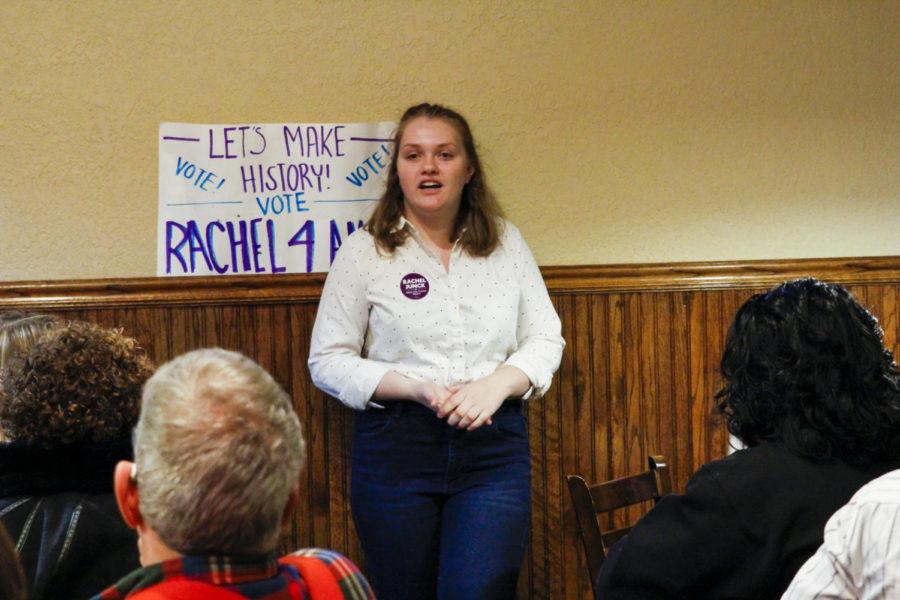- News
- News / Politics And Administration
- News / Politics And Administration / Campus
- News / Politics And Administration / City
Rachel Junck prepares to take City Council office
December 8, 2019
Rachel Junck is one of the youngest City Council members elected in Iowa, and she’s also a student representing the Iowa State body.
On Tuesday, Junck beat incumbent Chris Nelson by over 100 votes and will be sworn onto the Ames City Council on Jan. 2.
“The more I think about it, the more it makes sense because we had really put in the work to increase student turnout and voters, especially young voters in Ames,” Junck said. “And having that turnout increase when there’s only one race on the ballot was really amazing.”
Junck received 723 votes compared to incumbent Chris Nelson, who had 589 votes. There was a total of 1,313 people who voted in the Ward 4 election, which is 80 more voters than the election in November.
Although numerous articles had headlines stating Junck was the youngest woman elected in a political position in Iowa, she is actually the second youngest.
Victoria Lee, age 18, was elected to the Missouri Valley City Council in 2005. Lee died when an ex-boyfriend entered her trailer home, killed Lee and her husband and burned their home to the ground when Lee was 25.
“So she deserves the title of ‘youngest woman,’ but I’ve always said that even though it would be an honor to have the title, it’s [a] bigger honor to serve the people of Ames,” Junck said.
Though Junck is not the youngest woman elected to a political position, Junck said she hopes her election will open up a path for more young people to join the political atmosphere.
A lot of people might recognize Junck as one of the youngest City Council members elected, but she’s also in a senior majoring in chemical engineering and minoring in political science and Spanish at Iowa State.
“I guess a lot of people, when I’ve talked to them about it, are surprised that I’m not a political science major, but I’ve never thought of City Council as a career move but as a way to serve the people of Ames,” Junck said. “[Being on the Council] allows me to combine my passion for chemical engineering and […] I definitely think the problem solving that I do in engineering; all of the collaborative teamwork and different things that we do in my studies here will translate over the Council and be honestly helpful.”
Along with Junck’s passion for chemical engineering, she said she enjoys spending time outdoors with her friends and family. From a scientific point, Junck said she understands the severity of the climate situation.
Junck said she wants to continue the conversation about affordable and accessible housing as well as making Ames as carbon-neutral as possible. This means no net release of carbon dioxide into the atmosphere and bringing in more recycling and composting options citywide.
As Junck is preparing herself to be on the Council, she said she is also preparing herself to jump through the learning curves.
“I think [the budget] will be a big learning curve for me as well,” Junck said. “It’s been maybe a point where people have said ‘how does a 20-year-old have the life experience to balance a $250 million budget?’ But I do have the experience and the background of living in Ames and knowing what our community needs. From talking to our constituents, I’ve learned a lot and I’m excited to take on those budget discussions.”
Junck will be one of the two students to sit in on the Council’s meetings, the other being Ex-Officio Devyn Leeson, who is appointed by Iowa State’s Student Government.
While preparing for the elections, Junck became a regular at the bi-weekly City Council meetings. The meetings are typically 6 p.m. Tuesdays in the Council Chambers at Ames City Hall, unless otherwise stated.
“I think a weakness of mine is sometimes looking at things more negatively or being hard on myself,” Junck said. “Throughout this campaign, [that] has been a big way to grow as a person for me and be more confident in myself and my abilities, and not kind of shrink myself when people disagree with me but be able to have a civil conversation and understanding about ‘even if we disagree on things, both viewpoints are valid and important.’”
During one of the meetings, the Council had a prolonged conversation on rental and affordable housing, new ordinances and new state laws. At the meeting, Junck said votes were made on the Council which she felt a student could have added a different perspective to.
“I think one of the controversial decisions was early in the spring was the rental cap,” Junck said. “A lot of students felt that it would have disadvantaged them because they would no longer be able to rent properties in certain areas […] That, I know, was a contentious decision that took a lot for the Council to decide, and it was later repealed by the legislature, but I think a student with a vote in that decision would have been very important to have.”
The rental ordinance would have made it so a maximum of 25 percent of houses in campus neighborhoods could be rental units. This was part of the prolonged conversation on affordable housing that the Council had.

















